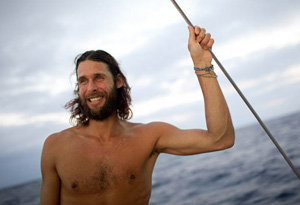Planet Ocean

Photo: Luca Babini
Is Earth the correct name for a planet that's mostly made of water? David de Rothschild—expedition leader of the Plastiki, a boat made of 12,500 recycled plastic bottles—ponders that question and more while floating across the Pacific.
Over the last few months, day in and day out, I've been breathing, sleeping and eating all things blue aboard the Plastiki. You might just call it a severe case of ocean on the brain—but I wouldn't describe it as an ailment. Instead, it's a humbling experience, a blessing that's allowed me to let the oceans—in all their majestic glory—preoccupy every aspect of my thoughts, to seep into every inch of my imagination and to become infused into every fiber of my being.I've floated on 14,000-foot-deep layers of it. I've viewed 360 degrees of it. I've definitely swallowed far more than I would like of it! All of which has helped me to become far more deeply and intensely connected with our oceans, which is why I can't help but think whoever named our planet was guilty of a terrible oversight. Surely "Earth" should really be known as "Ocean."
Think this is just the biased opinion of one recently converted land crab? You can't ignore the fact that salt water covers 72 percent of our planet's surface. The Pacific Ocean, on its own, is larger than the entire landmass of all the continents and subcontinents and innumerable islands combined. Put simply, whichever way you want to slice it, we are all part-ocean. In basic terms:
- No oceans = No place to hide the 41 percent of carbon that is so conveniently and fortunately absorbed by our oceans.
- No oceans = No protein supply to one-fifth of the world's population.
- No oceans = No home for the estimated 50 to 80 percent of all life on earth that lives under the surface of our oceans.
- No oceans = No place for the swordfish and the marlin, the fastest fish in the ocean, to reach their top speed of up to 75 miles per hour.
- No oceans = No deep water currents like the Gulf Stream that help keep our planet's climate livable!
- No oceans = No place for our largest living structure on earth to inhabit and, in turn, be able to have the perfect conditions for the 400 species of coral, more than 2,000 species of fish and 4,000 species of mollusks and other invertebrates that call the Great Barrier Reef their home.
- No ocean = No possibility of matching the astonishing fact that a mouthful of salt water contains millions of bacterial cells, hundreds of thousands of phytoplankton and tens of thousands of zooplankton, all of which might just hold the missing pieces of the puzzle that our future may depend on for survival.



